274 Search Results for video literacy
June 1, 2017
by Carole Zangari -
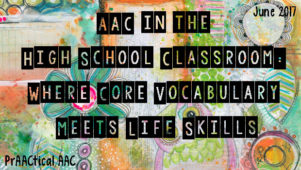
Today, guest blogger Sarah Mueller, a special education teacher in Rochester Michigan, shares her thoughts on supporting core vocabulary learning while working on functional life skills. Sarah teaches high school students with intellectual and developmental disabilities and strives to embed language and communication throughout her students’ entire school experience. Sarah helps her students become strong self-advocates as they prepare for adult life. Marlene Cummings, Sarah’s colleague and mentor, introduces the post. :::::::::::::::::::::::::::::::::::::::::::::::::::::::::::::::::::::::::::::::::::::: I (Marlene Cummings) had the pleasure of meeting Sarah 2 years ago as a new teacher in one of my districts. She immediately engaged in our county level professional learning opportunities in AAC and Literacy. The AAC focus presented strategies to support AAC and language learning including: core vocabulary, aided language input, vocabulary instruction and opportunities. The literacy focus was designed to create and implement a comprehensive literacy program taught by Drs. Karen Erickson and David Koppenhaver. The outcome:... [Read More...]
May 15, 2017
by Carole Zangari -
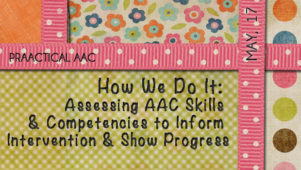
It’s Better Hearing and Speech Month ( #BHSM) and we are highlighting the work of talented AAC SLPs. We’re so happy to have Georgia-based Vicki Clarke back, this time with Holly Schneider, to talk about a longstanding collaboration that more AAC teams need to know about. Vicki’s private practice, Dynamic Therapy Associates, centers on AAC assessment and intervention. She works both with individuals and school districts, and serves children and adults with a variety of challenges and etiologies (e.g., motor disorders, memory, attention and learning difficulties, sensory impairment, neurological differences, syndromes and seizure disorders, congenital and acquired difficulties).Holly is a full time employee of Tobii Dynavox on the Clinical Content and Training Team. She is responsible for developing AAC training materials; and educating teams, professionals and families on AAC applications and implementation. In this post, they tell us about the development of the second edition of the Dynamic AAC Goals Grid.... [Read More...]
March 30, 2017
by Carole Zangari -
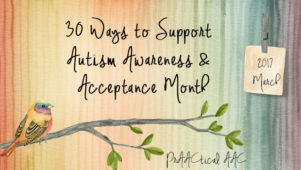
April is just around the corner and that means we’re getting ready to support the acceptance and inclusion of autistic people. Looking for ideas? Here are some to get you started. Treat yourself to some goodies from The Chocolate Spectrum (where you can order online, visit the cafe, or take a chocolate-making class) or other places that employ people with autism. Read and share 5 references that support the use of AAC & Autism. Help your family or community go beyond awareness and into acceptance. Learn and share information about Autism Safety – Be AWAARE! Know an autistic MineCraft lover? Introduce them to AutCraft. Educate yourself on terminology that relates to autism and people with ASD. We may have learned people-first language back in grad school, but there are different points of view on that. This is a great time to learn about identity-first language. Apply your critical reasoning skills to... [Read More...]
January 8, 2017
by Carole Zangari -
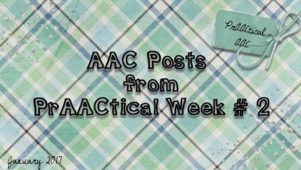
And the new year is off and running! Here are some posts you may have missed in your busy, AAC-filled week. Monday: PrAACtically January: AAC Resources for A Year of Core Words Wednesday: Video of the Week: Communication Strategies for Adolescents as They Transition through Adulthood Thursday: AAC and Emergent Literacy: 5 Posts with Implementation Ideas
December 8, 2016
by Carole Zangari -
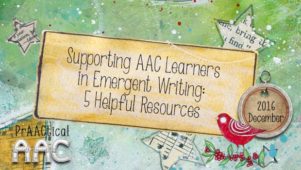
Looking for ways to help AAC learners of any age develop meaningful writing skills? These helpful resources may be of interest. “There is No Can’t” by Jane Farrall and Sally Clendon Emerging Writers and AAC by Jane Odom Alternative Pencils: What Does the Research Say? Emergent Literacy Beginnings and Goals for Children with Angelman Syndrome by David Koppenhaver and Susan Norwell (information applicable to a broader range of people who use AAC) Can Low-incidence Students Become First-time Writers? By Janet Sturm Happy exploring!
December 5, 2016
by Carole Zangari -
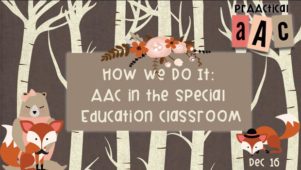
At the ASHA Convention last month, I chatted with an SLP about her secret longing: To take a sabbatical and travel the world to see AAC in action. Wouldn’t that be exciting?! In the meantime, we’ll have to live vicariously and peek into AAC practices through the words and pictures of dedicated professionals. Angi Pearce, a teacher at Kowhai Special School in Hastings, New Zealand, was kind enough to help us out and share her experiences in increasing AAC use in her classroom. Angi is the team leader for the Junior School classes (ages 5-11) and graciously prepared this post with support from SLP Michelle Roberts. As you’ll see, Angi is a highly experienced educator but new to the world of AAC and not afraid to take risks and embrace change. Let’s take a look at how a veteran teacher stretched herself to incorporate more AAC into her classroom. :::::::::::::::::::::::::::::::::::::::::::::::::::::::::::::::::::: AAC IN THE CLASSROOM My... [Read More...]
November 27, 2016
by Carole Zangari -
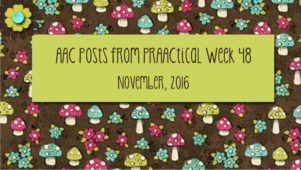
Monday – AAC Learning at ASHA 2016: Day 1 Wednesday – Video of the Week: Improving Literacy Outcomes for Individuals with ASD and Limited Speech Thursday – A Day for Giving Thanks Friday – PrAACtical Resources: AAC Partner Training Strategies
October 31, 2016
by Carole Zangari -
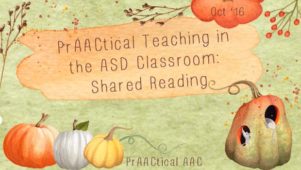
We are pleased to have a return visit from special educators Lauren Pawlowski and Amy Devin with ideas for supporting AAC learners in the classroom. Amy and Lauren, who work in the public school system in Michigan, taught in resource rooms for years and have been teaching in self‐contained ASD elementary classrooms since 2009. At that time, there were few classrooms who were integrating core language instruction, but they didn’t let that stop them. Currently, they use manual communication boards, large instructional core boards, and individual AAC devices with their students. They are passionate literacy teachers and, in today’s post, tell us about their approach to shared reading lessons. Their video is chock full of tips to help you make these lessons successful. Enjoy! Shared Reading: It’s Not What They Know, It’s What They THINK! Happy Fall AAC users and facilitators! This month we would like to share some of our tips for... [Read More...]
October 27, 2016
by Carole Zangari -
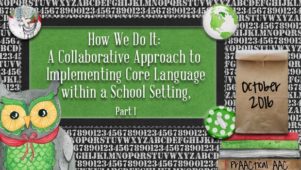
Nothing makes us smile like seeing teams in which professionals serving students with AAC needs work together to ensure that those students can use and grow their language skills. In this guest post, we learn about an approach that has worked for one such team, Lori Sanzeri and Chelsea Collins. Lori Sanzeri, MA CCC-SLP, TSHH, received her B.S. in Speech Language Pathology from SUNY Cortland in 2003 and M.A. from St. John’s University in 2009. She has worked for the NYC Department of Education since 2003 and teaches AAC and phonetics at St. John’s University. Chelsea Collins, MS CCC-SLP, TSSLD, received her B.S. in Special Education from Seton Hall University in 2009 and M.S. in Communicative Sciences and Disorders from New York University in 2012. She has worked for the NYC DOE since 2012 and specializes in AAC and early intervention. They are on Instagram as @thelanguageladies and have a Facebook page as... [Read More...]
October 10, 2016
by Carole Zangari -
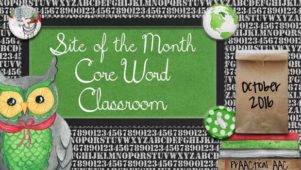
Looking for materials that you can use to support AAC in educational settings? AssistiveWare’s newest venture, The Core Word Classroom, may be just what you are looking for. While the materials align with their AAC app Proloquo2Go, the concepts, activity ideas, and planning tools have broad applicability. Jennifer Marden and Amanda Hartmann, who created most of the content for this new venture, introduce us to the site. :::::::::::::::::::::::::::::::::::::::::::::::::::::: The AssistiveWare Core Word Classroom is a resource for anyone who is implementing a core word-based AAC system. The materials focus on teaching using core words, as well as expanding communication beyond requesting to all the reasons we communicate, and helping AAC users use the full grammatical possibilities of language. The classroom materials are built around a framework called the 3W’s: WORDS – the core words that could be used for an activity WHYS – the many different reasons why we communicate... [Read More...]









